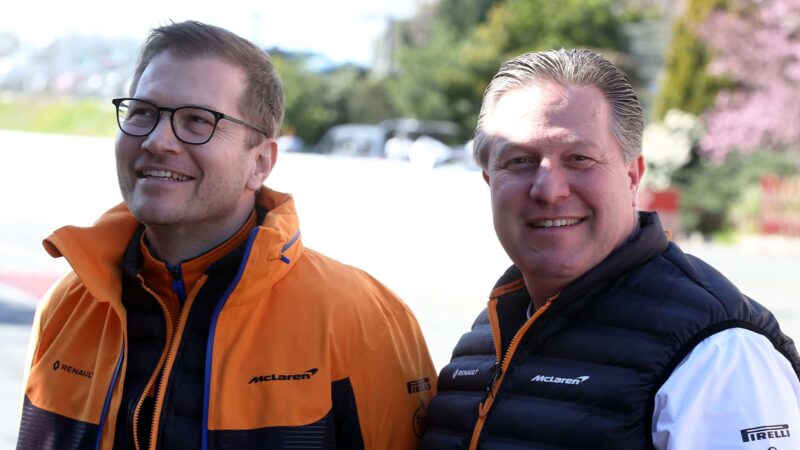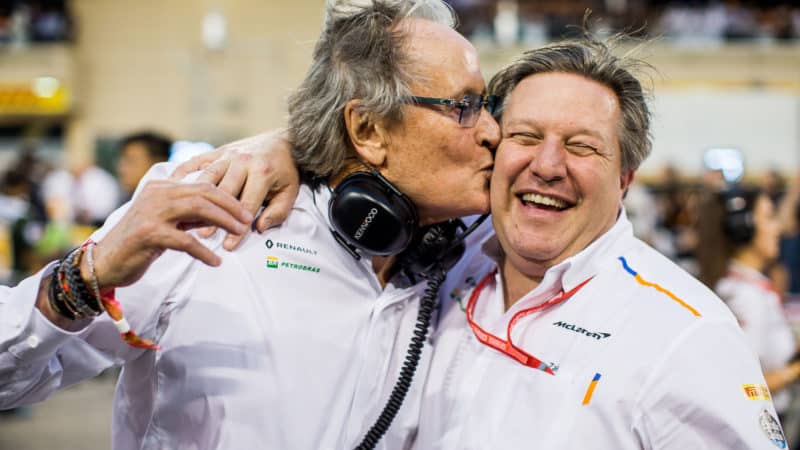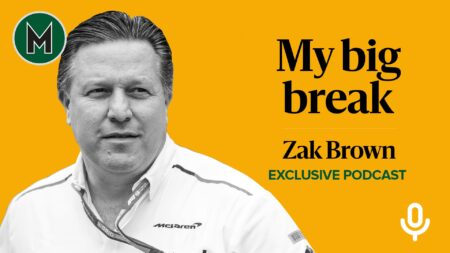“I’m in motor racing for passion and emotion, and Mansour oozed passion and emotion. He is very compelling when he’s in sales mode.
“I’d had some false starts with CVC and Bernie, historically. When Liberty first came in, and they brought in Chase [Carey], I was presented with an opportunity, but it was just a bit clunky, because they weren’t really fully through their acquisition.
“Then when you have Mansour and Shaikh Mohammed come in swinging, full throttle… just kind of: ‘You’re not leaving here until we do a deal.’ He was a deal guy. You felt really wanted. Whether you’re a CEO or a racing driver or wherever you’re going to go work, you want to feel that they really want you. It was really clear was I was the guy they wanted. That’s what pushed it over edge.”
Brown marked a departure from previous team bosses such as Eric Boullier and in-out appointment of now-Williams principal Jost Capito. He explained what he felt attracted the McLaren shareholders to him.
“I think it was the commercial side. I’m not a technician. So I don’t think it was: ‘Let’s get Zak in here because he’s going to build us a faster car’, but they knew I know how to run a business.
“I fully understood racing being a racer, and I was commercial guy. Right there you’ve got two things you need out of a racing team, the commercial side of the business and the on track performance.”

Andreas Seidl is one of ten key appointments, says Brown
Getty Images
Brown first met McLaren boss Ron Dennis through JMI and the pair became friends. He says that he had previously spoken to Dennis about a more “narrow” commercial role within the team, and the notion of supplanting him as head of the operation came out of the blue.
“It was surprising because I knew Mansour and Shaikh Mohammed – who represents the Crown Prince – but not that well,” he says.
“It was a little bit uncomfortable at first because you don’t want to get in the middle of what was going on – a very long-term relationship there breaking down – I like to get along with everyone. I have a ton of admiration for Ron.
“I spoke with him then, but I didn’t ask too much advice. As has been well documented, it was a pretty turbulent time. So I just kept my head down. I understood that the direction was coming from Mansour and Shaikh Mohammed and just really didn’t feel comfortable talking too much to anyone about it, because there was a lot of emotion in the boardroom as you can imagine.”
Brown might have had the full confidence of the shareholders, but he was less sure how the team would react to his appointment.
“It was pretty intimidating on the racing side of it, because I’m not technical. Starting with walking into the factory having 800-900 people, this legendary team, this iconic brand. And with – let’s face it –a bit of a revolving door with Martin Whitmarsh out Ron in, Ron out, Boullier, Capito. I think the team was probably thinking, you know, ‘How long is this guy gonna last?’
“I knew a decent amount of people at McLaren, because of my history [of commercial deals] there but not on the shop floor. I think it helped that I race. There’s also always a code within racing teams: ‘Is this guy a racer?’
Brown managed to weather his early difficult years at McLaren with the problematic Honda engine, before the team gradually fought its way up the grid, finishing third in the constructors’ championship in 2020. He credits this to a handful of crucial appointments.
“I would say that the the reason why we’re having success today is is getting the right people in place: Andreas Seidl [team principal], James Key [technical director], Andrea Stella [racing director and Piers [Thynne, operations director] have done an awesome job and that’s just on the racing side. I think I built a really strong leadership team that are doing a great job leading.
“Out of 800-900 people, I changed ten key ones but I think those 10 people have made a huge difference.
“I cannot think of a job I would rather have today. There’s not a team out there I love more than McLaren. I love living in England. I love that I have the freedom to bring us into IndyCar and Extreme E.”
“As tough is my first couple years at McLaren where I’ve not once felt I made the wrong decision.”


